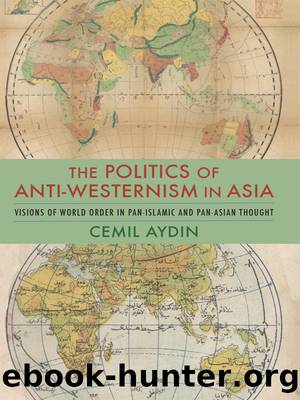Politics of Anti-Westernism in Asia by Aydin Cemil;

Author:Aydin, Cemil;
Language: eng
Format: epub
Tags: HIS003000, History/Asia/General, POL031000, Political Science/Political Ideologies/Nationalism
Publisher: Columbia University Press
Published: 2007-06-24T16:00:00+00:00
“CLASH OF CIVILIZATIONS” IN THE AGE OF NATIONALISM
Evaluating the trajectory of pan-Islamic and pan-Asian thought during the 1920s requires close attention to their relationship with the rising nationalist movements. Anticolonial nationalist movements were popularly interpreted as a revival of Asia and thus associated with a vague notion of Islamic and Asian triumph over the West. Yet there were no practical projects to create an alliance or solidarity among Asian nations, and overall the political destiny of pan-Islamic and pan-Asian movements did not match the intellectual vibrancy of their critiques of world order.
Turkeys success in renegotiating its boundaries and gaining membership in the new international system rendered it a great inspiration and model for anti-colonial nationalists in Asia. In India, China, and the rest of Asia, the success of the Turkish war for liberation became a model for nationalist movements.71 It was in this context that many Western observers interpreted the success of Turkey as the revival of Islam and the East. Where the term “pan-Islamism” continued to be used in the postwar period in the vocabulary of international affairs, it referred more to the general activism of the nationalist movements in specific Muslim nations and their moral and material solidarity, rather than expressing concern about the emergence of a united Islamic state. Thus contemporary observers perceived the 1920s as the era of the rising tide of anticolonial nationalism. For example, in 1921 Lothrop Stoddard, an American white supremacist and keen observer of anti-Western ideologies, presented an analysis of Muslim nationalism in a book titled The New World of Islam. He argued that the revival of Muslim nationalism and internationalism could not be reduced to the interest in Ottoman caliphate but instead was much broader and deep-rooted.72 A similar interpretation of Turkish nationalism and pan-Islamic revival came from Ôkawa Shûmei, in his Fukkô Ajia no Shomondai (Problems of a resurgent Asia), first published in 1922. Ôkawa hailed the movements initiated by Gandhi in India and Mustafa Kemal Paşa in Turkey as new types of Asian revival, though different in character, rooted in national cultures and traditions. For Ôkawa, the trend to emphasize cultural pride and civilizational revival symbolized a double effort toward independence in Asia, simultaneously spiritual and political and rejecting the legacy of Westernization.73
In the same work, Ôkawa demonstrated his idealist Asian internationalism by describing the rising nationalist movements in Asia and the conservative reaction of the Western imperial powers. Focusing on regions of non-Chinese Asia such as India, Thailand, Afghanistan, Persia, Turkey, Egypt, Mesopotamia (Iraq), Saudi Arabia, Tibet, and Siam, Ôkawa outlined two key aspects of pan-Asianism usually overlooked in the historiography, namely, its internationalism and its universalist claims based on a reverse Orientalist discourse of civilization. Ôkawa’s Asianism celebrated the history of anticolonial national awakening in Asia, characterizing the period from 1905 to 1920 as the era of “the rising tide of color against the white world supremacy.”74 For him, Asia was the site of a universal struggle for freedom from colonial “slavery.” After describing the internationalism represented
Download
This site does not store any files on its server. We only index and link to content provided by other sites. Please contact the content providers to delete copyright contents if any and email us, we'll remove relevant links or contents immediately.
| Arms Control | Diplomacy |
| Security | Trades & Tariffs |
| Treaties | African |
| Asian | Australian & Oceanian |
| Canadian | Caribbean & Latin American |
| European | Middle Eastern |
| Russian & Former Soviet Union |
The Secret History by Donna Tartt(16606)
The Social Justice Warrior Handbook by Lisa De Pasquale(11485)
Thirteen Reasons Why by Jay Asher(7777)
This Is How You Lose Her by Junot Diaz(5747)
Weapons of Math Destruction by Cathy O'Neil(5027)
Zero to One by Peter Thiel(4815)
The Myth of the Strong Leader by Archie Brown(4783)
Promise Me, Dad by Joe Biden(4439)
Stone's Rules by Roger Stone(4409)
Beartown by Fredrik Backman(4399)
How Democracies Die by Steven Levitsky & Daniel Ziblatt(4391)
The Fire Next Time by James Baldwin(4336)
100 Deadly Skills by Clint Emerson(4069)
A Higher Loyalty: Truth, Lies, and Leadership by James Comey(4024)
Rise and Kill First by Ronen Bergman(4007)
The David Icke Guide to the Global Conspiracy (and how to end it) by David Icke(3874)
The Farm by Tom Rob Smith(3868)
Secrecy World by Jake Bernstein(3773)
The Doomsday Machine by Daniel Ellsberg(3725)
